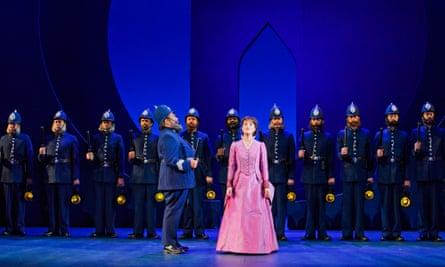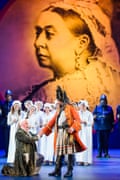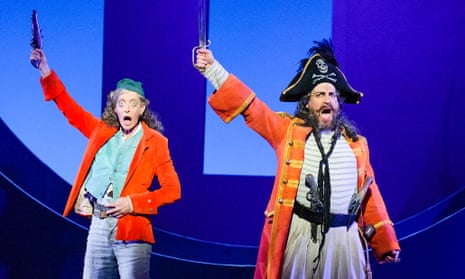Though one Gilbert and Sullivan production – Jonathan Miller’s seemingly immortal version of The Mikado – has been a regular part of English National Opera’s repertory for almost 30 years, the company’s subsequent track record with G&S has not been at all impressive. Stagings at the Coliseum of Princess Ida, The Gondoliers, and, in 2004, The Pirates of Penzance all failed to make a lasting impression. Now film director and self-confessed G&S enthusiast Mike Leigh, who was responsible for the wonderfully entertaining exploration of the relationship between Sullivan and his librettist in Topsy-Turvy, gets the opportunity to make a success of The Pirates of Penzance.
Leigh is the latest in a line of film and theatre directors who have been given the chance by ENO to try their hand at opera, and while his debut certainly isn’t a disaster, it’s not an outstanding, insightful success either. There’s no major reassessment, no real surprises, except perhaps in the look of the show, coming from a director whose films generally inhabit a rather shabby verismo world. Designer Alison Chitty’s sets are essentially abstract, in strikingly bold blues, greens, mauves and orange; the suggestion of the prow of a ship and a swag of rigging in the opening scene are the only concessions to naturalism, unless you count the portrait of Queen Victoria that descends for the final scene.
The costumes, on the other hand, would have fitted perfectly into any Pirates production from the fossilised days of the D’Oyly Carte company’s G&S, and the evening often seems more like an exercise in affectionate nostalgia than anything else. There’s nothing radical about the way in which any of the characters is conceived, but the comic business is deftly done, and the best of Gilbert’s lines are crisply delivered, though the dancing, what there is of it, is (perhaps deliberately?) a bit on the homespun side.


Despite its handful of famous numbers, the score is by no means one of Sullivan’s finest, but David Parry’s conducting does what it can with what there is – the orchestra plays superbly for him – and the cast is a good one. A role like the major general may be meat and drink to a singer of Andrew Shore’s proven comic gifts, but he delivers his patter-song with typical expertise, and his timing is, as ever, spot on. Jonathan Lemalu as the sergeant of police has the other big number, and Joshua Bloom is the dashing pirate king, whose bark is very much worse than his bite.
Robert Murray is Frederic, the apprentice pirate by mistake, and Rebecca de Pont Davies is the goggle-eyed Ruth, the maid of all work, who got him mixed up with the pirates in the first place. But the real discovery here is Claudia Boyle, who brings tremendous presence to the part of Mabel, and dispatches the dizzy bel canto parodies in her arias with impressive assurance.
- At the Coliseum, London, until 27 June. Box office: 020-7845 9300. It will be broadcast live to cinemas on 19 May, and on BBC Radio 3 on 29 June.

Comments (…)
Sign in or create your Guardian account to join the discussion